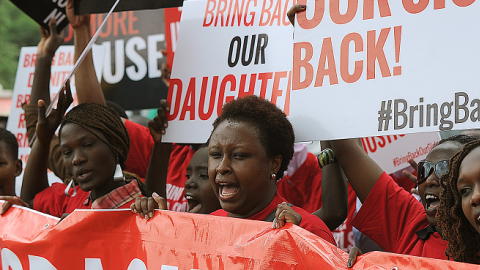Young girls who hope to improve their lives through education sometimes risk attracting the evil eye of radical Muslim terrorists.
One early lesson about Islamism and female schooling was taught to us by a remarkably courageous teenager, Malala Yousafzai. At 15 she was already an activist for education, encouraging young Pakistani girls to attend school and better themselves.
The Taliban shot her in the head.
Malala is recovering from her injury, and undeterred by continuing death threats, she tirelessly pursues her mission.
Meanwhile, world attention has been turned to different group of young female students and another brutal scenario.
On April 14, the terrorist group Boko Haram abducted more than 230 Nigerian girls at gunpoint from their Chibok boarding school. Their heavily-armed kidnappers shot two armed guards, herded the terrified girls into buses, vans and trucks and drove them off into the night. Only a few escaped.
The girls’ devastated parents haven’t seen them since. They are beside themselves, desperate to rescue their daughters.
Recent reports have made the bad news worse, indicating that the girls are to be sold as wives to jihadis – for about $12 each. Or, perhaps, marketed by sex traffickers.
The story of the missing Nigerian schoolgirls first appeared in scattershot Western reports. But it failed to gain much traction, even after the kidnapped girls had been missing for more than two weeks.
Hannah Strange put it well in the Telegraph, “…such an event would be a major departure from the norm on our shores, but in the grim litany of almost weekly bomb attacks and killings that have come to characterize Nigeria’s five-year Islamist uprising, which has claimed an estimated 1,500 lives this year alone, it is, tragically, not quite as extraordinary.”
Initially, the Nigerian story was circulated almost entirely by social media, where it was increasingly Liked, Shared and Tweeted. Before long, the hashtag #bringbackourgirls appealed globally for help.
And now at last, major news agencies have begun to write about it. But why did it take so long?
Would the abduction have been more compelling to Western readers if 200 blonde-haired, blue-eyed girls had been abducted? Wouldn’t there have been myriad heartrending stories about their families, their photos, their hopes and dreams?
In fact, a group of bright, young African students may well be sold into sexual slavery or worse. And that’s only part of a larger nightmare scenario in their homeland
Thousands of Nigerian Christians have been slaughtered in recent years by Boko Haram, and thousands more have fled. Victims have been burned alive in their churches, murdered in their homes and massacred in the streets of the villages.
It has become a gruesomely familiar story.
The name Boko Haram is shorthand in the Hausa language for “Western education is sinful,” and its followers observe a Koranic declaration: “Anyone who is not governed by what Allah has revealed is among the transgressors.”
In their view, any form of education that contradicts the group’s radical Islamist views -- including teaching Christianity in schools and churches -- is subject to ferocious violence and mass murder.
The education of girls is entirely forbidden. And the captivity, rape, forced marriage and sexual slavery of young women embodies Boko Haram’s low view of females. It also provides a menacing look at the Caliphate the group hopes to establish in Nigeria and the surrounding territories.
In many ways Boko Haram mirrors the Taliban’s fierce intentions in Afghanistan and Pakistan.
Which brings us back to Malala.
Tuesday, on her website, she held a sign saying “#Bringbackourgirls.” She and the Malala Fund are pleading with Nigeria and the international community for urgent action.
“These abducted schoolgirls are my sisters,” Malala told the New York Times, “and I call on the international community and the government of Nigeria to take action and save my sisters…. It should be our duty to speak up for our brothers and sisters in Nigeria who are in a very difficult situation.”
And last there is a tiny glimmer of hope. Fox News is now reporting that the White House plans to send a team to Nigeria that would include U.S. military and law enforcement personnel. Stressing that the kidnappings happened 22 days ago, spokesman Jay Carney pointed out,
"Time is of the essence. Appropriate action must be taken to locate and to free these young women before they are trafficked or killed."
As the saying goes, better late than never.

















